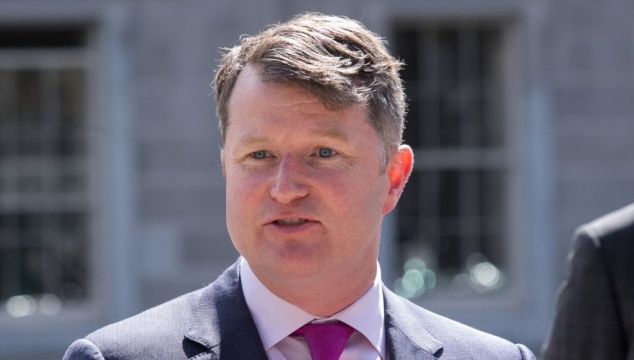Calls for hate speech legislation to be scrapped are unnecessary, while definitions in the Bill can be tightened, according to a Fianna Fáil senator.
Debate around the Criminal Justice (Incitement to Violence or Hatred and Hate Offences) Bill has intensified in recent weeks, with some TDs calling on incoming taoiseach Simon Harris to scrap it altogether.
Sinn Féin has called for the Bill to be abandoned despite the fact all of its TDs voted in favour of it in the Dáil.
Former minister for justice Charlie Flanagan and TD Michael Ring from Fine Gael, and Fianna Fáil TD and former minister for defence Willie O'Dea, have echoed these sentiments.
Senator Malcolm Byrne told BreakingNews.ie that the Bill is important and is "not really about hate speech, this is about speech that incites violence".
"This is not about preventing people saying horrible or awful things... this doesn't do that, nor should it. It will protect those people who want to say horrible and awful things. However, there is a line that has to be drawn between strong opinions and particular views, and where you actually incite violence."
Opponents to the Bill have claimed it will lead to prosecutions for people with controversial views. However, Mr Byrne said this is inaccurate.
He also said the definitions in the Bill will be tightened in the next phases of the legislative process.
If we do proceed with it, obviously there has to be a very high standard of proof.
"If we do proceed with it, obviously there has to be a very high standard of proof. I do think there is probably a need to strengthen some of the definitions in the existing Bill. I don't think there should be any doubt. If there is going to be prosecution in these cases, it should be very clear that somebody is trying to incite violence fuelled by hate as a result of their words. That is what we're looking to address."
"The definitions need to be tight. I would oppose anything that would inhibit freedom of expression. What we're really talking about here is speech that incites violence," he added.
In a recent opinion piece in The Journal, Mr Byrne discussed the death of Dutch politician Pim Fortuyn.
Mr Fortuyn founded a political party that came second in The Netherlands' general election in 2002.
Mr Fortuyn was gay. A critic of Islam, he argued it was a threat to the Dutch way of life. However, he defended the right to free speech of homophobic Islamic leaders. However, he said: "An imam should be able to say that homosexuals are worse than pigs. My only demand is that you mustn’t incite violence."
Mr Fortuyn was shot dead nine days before the election.
Mr Byrne said: "Similarly, people with a fundamentalist religious view who are deeply critical of Christianity... they're entitled to say horrible things about Christianity, but they're not allowed to encourage their supporters to say Christians should be put to death.
A casual remark wouldn't be deemed to be sufficient.
"The test is very clear. If we are looking at something that is a crime, you have to prove beyond a reasonable doubt that somebody is looking to incite violence as a result of their words, so a casual remark wouldn't be deemed to be sufficient. Where somebody is clearly engaged in a campaign of hate against an individual because of their identity, you can gather evidence to that effect.
"This legislation is in place in most countries. In places like Germany, for obvious historical reasons, it's particularly strong."
Elon Musk has previously spoken out against the proposed hate speech legislation.
However, Mr Byrne pointed out it isn't looking to do anything different to what is outlined in the community standards on sites like Mr Musk's X, formerly Twitter, and Facebook.
"We also have community standards on platforms such as Facebook or X. It lays down what they regard as hate speech.
"Even the likes of Elon Musk recognises that hate speech exists, and that certain forms of speech that incite violence need to be restricted.
"X provides for that, all we're doing in Ireland is where speech incites violence against people, we're just looking to modernise our laws to do that."
He added: "There are a couple of questions for Elon Musk. For instance, if he's so strong on free speech, why did X choose to appear in private rather than in public before the Oireachtas Media Committee?
"Why did Elon Musk on Twitter regularly look to censor people who criticise him?
"The ultimate question around X's own community standards is, does he believe they are appropriate? These are the standards of his company. They might not always be enforced, but in many ways, all the legislation is doing is dealing with the same sort of issues that X is supposed to deal with through its own community standards."
He reiterated that the legislation is not designed to suppress unpopular opinions.
"Our obligation as legislators is to protect citizens, it is not to protect citizens against nasty comments. People will always be awful and engaging in nasty comments. You have to put up with it. However, if someone is inciting violence against an individual, it is a much more serious situation."

On the criticism of the legislation from Government TDs, Mr Byrne said the definitions should be amended, rather than scrapping the legislation entirely.
He added that it is important to have legislation addressing the modern world in place of the Prohibition of Incitement to Hatred Act, 1989.
"A number of us within Fianna Fáil have been saying we need to amend the legislation, but the principle is still there. Citizens, particularly minorities, need to be protected from violence.
"That's the purpose of this legislation. We can argue about the wording, but we shouldn't lose track of the actual purpose.
"To be prosecuted for a crime requires a particular level of evidence and burden of proof. You are not going to be prosecuted for saying something hateful. However, if you look to incite violence against a minority, there may be consequences. Indeed, there should be consequences.
"If you say that all members of a particular group deserve to be killed, and you organise a campaign to try to do that, you shouldn't be able to wave a flag saying 'I'm entitled to free speech'.
"There are lots of issues in justice we have to address, including Garda recruitment and retention, but I think it is critical to get this piece of legislation over the line in the lifetime of this Oireachtas."







